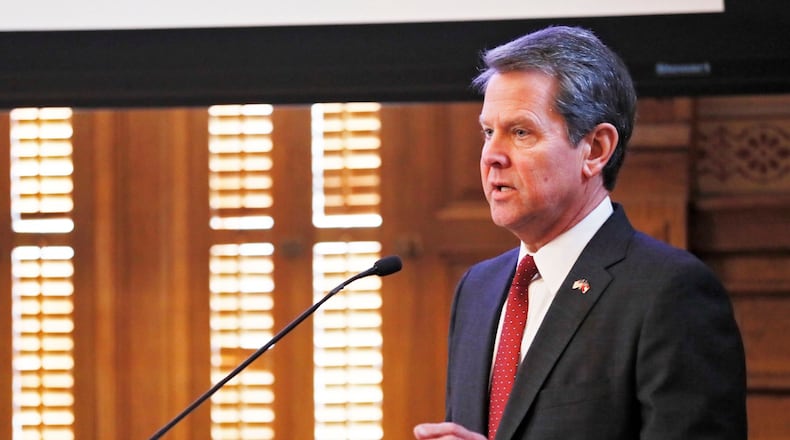Gov. Brian Kemp will ask the Georgia Legislature and the federal government for flexibility to improve access to government-funded health insurance for the state’s poor and middle class.
His administration told The Atlanta Journal-Constitution on Thursday that it will back a measure that seeks two separate federal “waivers” to Medicaid and the Affordable Care Act to tailor new programs to Georgia’s needs.
Kemp plans to build support for the measure with a listening tour and a social media blitz after it’s introduced next week.
The ACA waiver, which he outlined on the campaign trail, aims to stop premiums on the health insurance exchange market from rising so fast. A second push, which emerged after his election, would raise the possibility of a partial expansion of Medicaid to some of Georgia’s poorest residents.
“To ensure a bright and healthy future for hardworking Georgians, we must increase access to quality, affordable health care,” Kemp said. “By rejecting the status quo and embracing innovative solutions, we can put the needs of patients first.”
The decision could put Kemp in precarious political territory. While some Republicans say Georgia should try to leverage the Affordable Care Act to help rural communities, others fear expansion could leave taxpayers on the hook for huge payouts if the federal commitment ever wanes.
Kemp’s aides maintain that he won’t support outright Medicaid expansion, which he opposed on the campaign trail. But they also said he’ll direct a consultant to devise several options, including some that could allow a more limited expansion of the program.
Several states have used waivers to add hundreds of thousands of new residents to their rolls, some proposing conservative elements such as work requirements. Kemp’s advisers said work requirements could be one of the options, but that the governor — who has the final sign-off — wants to see a range of alternatives before he decides.
The waivers are expected to be submitted and approved by 2020 — in time for the presidential election.
The Medicaid debate concerns between 300,000 and 600,000 Georgians, according to estimates from health advocacy groups.
Those people are too poor to be eligible for Obamacare subsidies but are not currently eligible for Medicaid. They have no coverage at all but sometimes show up at emergency rooms, where they run up costs for hospitals that treat them anyways.
Kemp’s administration has budgeted $1 million to hire a consulting team to investigate the best option, mine statistical and population data, and begin the bureaucratic work of navigating the process with federal decision-makers in Washington.
It will also need to develop proposals that could withstand court scrutiny. Critics of work requirements, for instance, have challenged the policy in federal court. The only judge to rule so far found a work requirement violates the purpose of the Medicaid law, which was to cover the poor.
That effort is not likely to include former U.S. Health and Human Services Secretary Tom Price, who was a member of Kemp’s transition team. Kemp earlier indicated that Price could help propose the idea to Washington, but his administration said Thursday that Price would not be directly involved in the waiver applications.
Health care advocates expressed cautious optimism. Laura Colbert, the executive director of the patient advocacy group Georgians for a Healthy Future, said she worries that a waiver could include work requirements , but that it was “exciting” to see movement.
“Georgia consumers have been waiting for the last seven years for our leaders to make the decision about whether or not they have a pathway to coverage,” she said.
Kemp and his allies say they’re searching for a solution that could address accessibility, affordability and quality, without full Medicaid expansion.
His deputies often cite a shortage of health care professionals in rural areas, including nine counties with no physicians, and point to studies that show insurance premiums have dropped in several states that have approved similar waivers.
“Big picture: We hear very loudly and clearly that people don’t have access to care,” said Frank Berry, the commissioner of the state’s Department of Community Health.
“We know that’s a big bucket we want the consultant to look at. We don’t know from an access standpoint — what are the services that can help improve people’s quality of life. That’s what we’ll be looking at.”
There’s also a political motivation to get the issue off the table before the next election cycle.
Democrats, including Kemp rival Stacey Abrams, have rallied around Medicaid expansion, and polls show the idea has broad popular support among Georgians. AJC polls have consistently shown that more than 70 percent of Georgians support expanding Medicaid coverage for the poor. That now includes a slight majority of Republicans.
Democratic leaders say full-on expansion is the only way to spur the economy, cover hundreds of thousands of Georgians and help rural hospitals. In the AJC’s latest poll, though, a majority of Georgians supported a work requirement.
State Senate Minority Leader Steve Henson, the chamber's top Democrat, echoed his party's sentiment on Thursday when he demanded that his colleagues hold a hearing to explore expansion.
“We’ve talked about this for a long time. We’ve heard about waivers,” he said. “But I want you to know that nothing you can do this session would bring more benefits to people than if we embrace Medicaid expansion.”
Stay on top of what’s happening in Georgia government and politics at ajc.com/news/georgia-government/.
Keep Reading
The Latest
Featured





